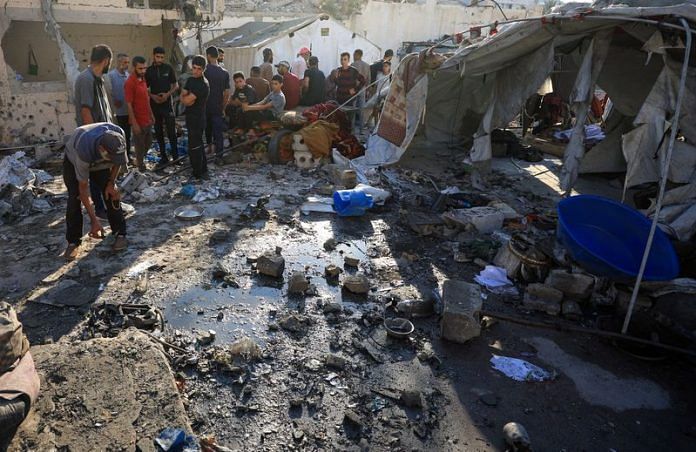By Nidal al-Mughrabi and Emily Rose
JERUSALEM/CAIRO (Reuters) -Israel brought its delegation home from Gaza ceasefire talks for consultations on Thursday after Hamas delivered a new response to a proposal for a truce and hostages deal.
The Israeli prime minister’s office thanked mediators for their efforts and said the negotiators were returning home for “further consultations”. Earlier it said Israel was reviewing the response from the Palestinian group.
Both sides are facing pressure at home and abroad to reach a deal following almost two years of war, with the humanitarian situation inside Gaza deteriorating sharply amidst acute hunger that has shocked the world, and Israelis worried about the conditions in which hostages are held.
Dozens of people have starved to death in Gaza the last few weeks as a wave of hunger crashes on the Palestinian enclave, according to local health authorities. The World Health Organization said on Wednesday that 21 children under the age of five were among those who died of malnutrition so far this year.
Later on Thursday, the Gaza health ministry said two more people had died of malnutrition. The head of Shifa Hospital in Gaza City said the two were patients suffering from other illnesses who died after going without food for several days.
Two sources familiar with the negotiations in Qatar said Israel’s decision to bring its delegation home did not necessarily indicate a crisis in the talks.
But the Hostages Families Forum, which represents the family members of those being held in Gaza, expressed “concern” that the Israeli team had been recalled to Israel and urged Israeli and American leaders to act quickly.
“Each day that passes endangers the hostages’ chances of recovery and risks losing the ability to locate the fallen or gain vital intelligence about them,” the statement said.
A senior Hamas source told Reuters on Thursday that the group’s response said no negotiation sessions had yet been held on a prisoner exchange, which it described as a top priority, and that it had submitted a new framework on the matter to mediators.
A senior Israeli official was quoted by local media as saying the new text was something Israel could work with. However, Israel’s Channel 12 said a rapid deal was not within reach, with gaps remaining between the two sides, including over where the Israeli military should withdraw to during any truce.
Israel, which cut off all supplies to Gaza from the start of March and reopened it with new restrictions in May, says it is committed to allowing in aid but must control it to prevent it from being diverted by militants.
It says it has let in enough food for Gaza’s 2.2 million people over the course of the war, and blames the United Nations for being slow to deliver it; the U.N. says it is operating as effectively as possible under conditions imposed by Israel.
AIRSTRIKES AND AID CHAOS
In Gaza on Thursday, the distribution of food to desperate Palestinians was a picture of chaos.
Women going to fetch aid for their families said U.S. contractors organising distribution asked them to come to pick up goods and then fired tear gas and pepper spray at them.
“The Americans said “go, go”, and then said no, get back. They sprayed us with pepper spray so we went away. Five minutes later they shot tear gas at us … is this American humanitarian aid?” said Mervat al-Sakani.
The U.S. contractors are part of an effort the U.S. and Israel have backed to take the lead on aid distribution from the United Nations, through a group called the Gaza Humanitarian Foundation.
GHF did not immediately respond to requests for comment on the incident. Hungry Gazans have been shot dead on numerous occasions while going to collect aid as food supplies run low.
The war between Israel and Hamas has been raging since Hamas killed some 1,200 people and took 251 hostages from southern Israel in the deadliest single attack in Israel’s history.
Israel has since killed nearly 60,000 Palestinians in Gaza, decimated Hamas as a military force, reduced most of the territory to ruins and forced nearly the entire population to flee their homes multiple times.
Israeli forces on Thursday hit the central Gaza towns of Nuseirat, Deir Al-Balah and Bureij. Health officials at Al-Awda Hospital said three people were killed in an airstrike on a house in Nuseirat, three more died from tank shelling in Deir Al-Balah, and separate airstrikes in Bureij killed a man and a woman and wounded several others.
Nasser Hospital said three people were killed by Israeli gunfire while seeking aid in southern Gaza near the so-called Morag axis between Khan Younis and Rafah. The Israeli military said Palestinian militants had fired a projectile overnight from Khan Younis toward an aid distribution site near Morag.
Washington has been pushing the warring sides towards a deal for a 60-day ceasefire that would free some of the remaining 50 hostages held in Gaza in return for prisoners jailed in Israel, and allow in aid.
U.S. Middle East peace envoy Steve Witkoff travelled to Europe this week for meetings on the Gaza war and a range of other issues. An Israeli official said Strategic Affairs Minister Ron Dermer would meet Witkoff on Friday if gaps between Israel and Hamas over ceasefire terms had narrowed sufficiently.
(Reporting by Nidal Al-Mughrabi, Emily Rose, Samia Nakhoul, Ahmed Elimam and Maayan Lubell Writing by Crispian BalmerEditing by Clarence Fernandez and Peter Graff)
Disclaimer: This report is auto generated from the Reuters news service. ThePrint holds no responsibility for its content.




